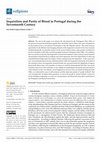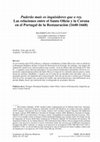Books by ANA ISABEL LÓPEZ-SALAZAR
Books (ed.) by ANA ISABEL LÓPEZ-SALAZAR
López-Salazar, Ana Isabel y Moreno Díaz del Campo (coords): La Monarquía Hispánica y las minorías... more López-Salazar, Ana Isabel y Moreno Díaz del Campo (coords): La Monarquía Hispánica y las minorías Élites, poder e instituciones, Madrid, Sílex, 2019.
Papers by ANA ISABEL LÓPEZ-SALAZAR
A Inquisição portuguesa. 200 anos depois, 2024
Todos os direitos reservados. A reprodução não autorizada desta publicação, por qualquer meio, se... more Todos os direitos reservados. A reprodução não autorizada desta publicação, por qualquer meio, seja total ou parcial, constitui violação da Lei n. 9.610/98. Sumário Apresentação 1 PARTE 1: HISTÓRIA E DOCUMENTAÇÃO Fontes inquisitoriais e historiografia brasileira sobre o período colonial 9 Angelo Adriano Faria de Assis & Ronaldo Vainfas A memória no arquivo: registos dos primeiros anos da Inquisição em Portugal 25 Susana Bastos Mateus Aspetti dell'Inquisizione portoghese nelle carte del Sant'Ufficio romano. Fonti e prospettive di ricerca per il secolo XVIII

Religions 14: 1338, 2023
The aim of this paper is to analyse the role played by the Portuguese Holy Office in the process ... more The aim of this paper is to analyse the role played by the Portuguese Holy Office in the process of social discrimination against New Christians, that is, those who were considered to be descendant of Jews converted to Christianity in the late fifteenth century. This article focuses specifically on the different and changing attitudes of the Inquisitors General to the issue of purity of blood during the seventeenth century. In the course of that century, some people considered to be New Christians (with fama or nota) managed to join the Portuguese Holy Office. Nevertheless, this was not due to the fact that Inquisitors General and members of the General Council rejected discrimination using theoretical, religious and moral arguments, but to the impossibility of achieving undoubtful knowledge about the origins of those seeking to join the Inquisition. At the same time,
once racial discrimination became institutionalised within the Inquisition during the final third of the sixteenth century, the Inquisitors General became less concerned about the allegations of impure blood made about some of its ministers, so long as it could be demonstrated that they were good Christians and of use to the institution, or else capable of contributing to the specific personal interests of the tribunal’s rector. Nevertheless, not all supposed or real conversos succeeded in joining the Holy Office, as evidenced by cases of self-exclusion and the numerous proofs of “purity of blood” that were not approved. To address these questions, we turn to the proofs of “purity of blood” carried out by the Portuguese Inquisition, as well as to correspondence and documents from other institutions of the Portuguese and Spanish monarchies.

Estudis. Revista de Historia Moderna, 2021
Resumen: El presente artículo se centra en los conflictos provocados por la posesión de beneficio... more Resumen: El presente artículo se centra en los conflictos provocados por la posesión de beneficios eclesiásticos por parte de los ministros de las Inquisiciones de España y Portugal. El Santo Oficio contaba con un privilegio papal que permitía que sus miembros percibiesen las rentas de sus beneficios sin cumplir con la obligación de residencia. Ello generó numerosos conflictos, especialmente enconados en el caso de las canonjías doctorales, pues los breves de erección de estos beneficios establecían la estricta residencia en ellos de los canónigos. En este trabajo se analiza la intervención de la Santa Sede, a través de la Congregación del Santo Oficio, en los pleitos entre las inquisiciones de España y Portugal y los cabildos catedralicios motivados por el incumplimiento del deber de residencia en las canonjías doctorales de los ministros del Tribunal de la Fe.
Cuadernos de Historia Moderna, 2021
El objetivo del presente artículo es el estudio de las procedencias geográficas, las carreras en ... more El objetivo del presente artículo es el estudio de las procedencias geográficas, las carreras en la Universidad, la Iglesia y la Administración y los orígenes sociales de los canónigos doctorales portugueses de los siglos XVI y XVII. Se trató de un grupo muy específico dentro de la Iglesia portuguesa, ya que las doctorales de las diócesis antiguas eran canonjías de patronato regio provistas por concurso en la Universidad de Coimbra. El análisis de los orígenes sociales de estos prebendados demuestra que las doctorales quedaron mayoritariamente en manos de la aristocracia no titulada, las élites locales, tanto de las ciudades como de las zonas rurales, y los grupos letrados vinculados al servicio regio.
La Monarquía Hispánica y las minorías. Élites, poder e instituciones, 2019
The integration of Portugal in the Hispanic Monarchy caused a problem in the communication betwee... more The integration of Portugal in the Hispanic Monarchy caused a problem in the communication between the Portuguese Inquisition and the Crown, at the time located in Madrid. To prevent the constant intervention of the Council of Portugal and the viceroys in the matters of the Holy Office, the Inquisition tried to establish several ways to communicate directly with the king. The most original was the integration of the favorites and the secretaries of State in the inquisitorial institution. After the Restoration, the secretaries of State conserved the position of secretaries of the Holy Office until 1736, demonstrating the efficiency of certain institutional innovations of the Philippine period.
Resumen: Sin duda, durante la Edad Moderna, el más rico, prestigioso y poderoso cabildo catedrali... more Resumen: Sin duda, durante la Edad Moderna, el más rico, prestigioso y poderoso cabildo catedralicio portugués fue el de Évora. Sin embargo, hasta ahora no existe ningún estudio sobre esta institución centrado en los siglos modernos. Por ello, con este artículo, se pretende alcanzar un doble objetivo. Por un lado, se estudia la evolución institucional del cabildo desde la elevación de Évora a sede metropolitana hasta los inicios del siglo XIX. Por otro, se analizan las vías de ingreso en el cabildo con el objetivo de conocer el equilibrio de poderes entre la Santa Sede y el arzobispado y las vías extraordinarias (coadjutorías y resignas) utilizadas por determinadas familias para conservar y transmitir las canonjías y dignidades capitulares convertidas, casi, en bienes patrimoniales.

Ya en el mismo siglo XVII, políticos y religiosos consideraron el Santo Oficio luso como un aliad... more Ya en el mismo siglo XVII, políticos y religiosos consideraron el Santo Oficio luso como un aliado de la Monarquía Hispánica durante la Guerra de Restauración de Portugal. Sin embargo, esta imagen del tribunal fue creada en un contexto político muy concreto -el de los últimos años del reinado de D. João IV-y responde a unos intereses particulares. En este artículo intentaremos desentrañar cuál fue la evolución del comportamiento político del Santo Oficio a lo largo de los veintiocho años de guerra y cuáles fueron las opciones, fidelidades y vínculos con la Corona de sus miembros más relevantes, esto es, el inquisidor general y los diputados del Consejo General. Todo ello nos llevará a concluir que el Tribunal de la Fe no fue, en ningún caso, una plaza de Castilla, sino una institución que, como había hecho en el período filipino, buscó, por encima de todo, la salvaguarda de sus propios intereses.
The Inquisition was established in Portugal in 1536. From the beginning, the pope authorized the ... more The Inquisition was established in Portugal in 1536. From the beginning, the pope authorized the Portuguese king to choose the General Inquisitor, who was granted authority by the pope to pursue and punish crimes of heresy. This article investigates the Portuguese General Inquisitors during the seventeenth century in order to establish their social background, politics, ecclesiastical careers, and links with the Crown. The aim is to discover the relationships they had with the Crown and to understand how far they managed to preserve the autonomy of the Inquisition in relation to the Crown and the Holy See.
in López-Salazar Codes, Ana Isabel; Olival, Fernanda, & Figueirôa-Rêgo, João: Honra e sociedade n... more in López-Salazar Codes, Ana Isabel; Olival, Fernanda, & Figueirôa-Rêgo, João: Honra e sociedade no mundo ibérico e ultramarino: Inquisição e Ordens Militares (séculos XVI-XIX), Lisboa, Caleidoscópio, 2013, pp. 129-154.
in Cardim, Pedro; Costa, Leonor Freire & Cunha, Mafalda Soares da (orgs): Portugal na Monarquia H... more in Cardim, Pedro; Costa, Leonor Freire & Cunha, Mafalda Soares da (orgs): Portugal na Monarquia Hispânica. Dinâmicas de integração e conflito, Lisboa, CHAM-CIDEHUS-GHES-Red Columnaria, 2013, pp. 187-201.











Uploads
Books by ANA ISABEL LÓPEZ-SALAZAR
Books (ed.) by ANA ISABEL LÓPEZ-SALAZAR
Papers by ANA ISABEL LÓPEZ-SALAZAR
once racial discrimination became institutionalised within the Inquisition during the final third of the sixteenth century, the Inquisitors General became less concerned about the allegations of impure blood made about some of its ministers, so long as it could be demonstrated that they were good Christians and of use to the institution, or else capable of contributing to the specific personal interests of the tribunal’s rector. Nevertheless, not all supposed or real conversos succeeded in joining the Holy Office, as evidenced by cases of self-exclusion and the numerous proofs of “purity of blood” that were not approved. To address these questions, we turn to the proofs of “purity of blood” carried out by the Portuguese Inquisition, as well as to correspondence and documents from other institutions of the Portuguese and Spanish monarchies.
once racial discrimination became institutionalised within the Inquisition during the final third of the sixteenth century, the Inquisitors General became less concerned about the allegations of impure blood made about some of its ministers, so long as it could be demonstrated that they were good Christians and of use to the institution, or else capable of contributing to the specific personal interests of the tribunal’s rector. Nevertheless, not all supposed or real conversos succeeded in joining the Holy Office, as evidenced by cases of self-exclusion and the numerous proofs of “purity of blood” that were not approved. To address these questions, we turn to the proofs of “purity of blood” carried out by the Portuguese Inquisition, as well as to correspondence and documents from other institutions of the Portuguese and Spanish monarchies.